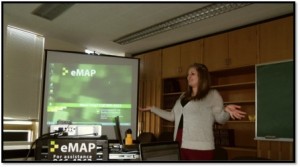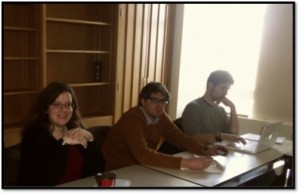I find the most
difficult part of presenting at conferences to be the question section. There is
something about being put on-the-spot that causes one to completely forget the entirety
of one’s knowledge base. One frantically searches the suddenly blank depths of
one’s mind for a semi-intelligent response. The ability to gracefully answer on-the-spot
questions must be an acquired skill, one that is honed over time. Of course,
most of the question-period agony is purely psychological; (unless you’re
epically bombing) the struggle to recall is likely unnoticeable to the
audience. I had one of these experiences
this past Friday when I presented at the University of Saskatchewan
Graduate Student Association’s 2014 Conference, “Curiosity.” My two of my
colleagues, Glenn Iceton and Laura Larsen, and I spoke about our respective
dissertation topics, why they interest us, and how these topics connect to
contemporary society. I focused largely on the growing trend in the United
States for state governments to propose state park closures as means by which
to deal with growing budgetary restraints. I juxtaposed this trend with the
rhetoric of the early twentieth-century, when state parks were referred to as
“necessities,” access to which was considered a basic human right.
The
question that spawned this post was asked by fellow history graduate student,
Fedir Razumenko. Informed by some recent comps reading he has been doing in his
environmental history field, Fedir asked me something to the effect of how
parks, which have been central to preservation, could now be deemed disposable by
government when preservation is such a focal point of today’s society, he
followed up by asking whether parks are indeed economically defunct, as state
government actions would suggest. As I remember it, I sputtered, though fairly
smoothly I think, something about conservative governments and general cuts,
and the disconnect between bureaucracy and rural communities. Although it was a
decent, passable answer, it was certainly not the well-informed, expert
commentary I would have liked to have sprung forth from my mouth. And being the
neurotic individual that I am, I obsessed all weekend about what I should have
said. Thus, I decided to write this post in order to talk a bit more about the
trend of state park closures and facilities cuts.
In
all actuality, the topic is immensely complex and I do not have a concrete
answer for Fedir—the ability to answer this question is, after all, partially
why I am pursuing my dissertation topic. However, there are a few ideas that I
would like to muse over. Firstly, most of the state park closures, both enacted
and proposed, such as California and New York, are in those states where the
state park systems are rather large, 100+ parks, and expanded rapidly in the
early-to-mid-twentieth-century. There was such enthusiasm for state park system
expansion that people thought little of the future effects of adding dozens,
even hundreds of parks. Parks were beneficial, plain and simple. Yet, there
were those that recognized the folly early on. For instance, I found in my
research a letter[1] from Herbert
Evison, Executive Secretary for the National Conference on State Parks, to W.F.
Aiken, Secretary of the Alberta Provincial Parks Board, in 1932, warning Aiken
to not let Alberta make the same mistake as many states and load up on many
small parks, but rather to focus on establishing several large parks.
And indeed, many states are now finding these
parks to be an expensive luxury. Perhaps Evison was ultimately correct. Perhaps
state park systems as they exist now are not sustainable. Though much more analysis
needs to be done on how and when this shift from describing state parks as
necessity to expendable occurred. The main problem is that communities
and individuals have become dependent on the existence of many of these parks.
Very few of us want to see them go or even evolve into something new.
Secondly,
I wanted to address state parks as important instruments of preservation and
how their closure will effect preservation efforts. I would contend that state
parks, for the most part, are not primarily in the business of preservation.
Recreation and accessibility have always been the primary concern for state
parks with preservation being a positive parallel effect. When a state park is
closed the state still owns the land, what changes is that there is no longer a
dedicated staff and the facilities, from restrooms to trails, are no longer
maintained. People can still access the park land at their own risk. Since over-visitation
is likely the greatest threat to the ecological integrity of our parklands, would
the land now held in state parks not benefit from park closure? In a sense, the
land would just become conservation land. So, perhaps, the negative effect of
state park closures is only social and economic, not environmental. Of course
this is assuming that the states do not start finding means by which to divest
themselves of the former park land and that rates of illegal poaching, logging,
littering, etc. do not rise on the newly unsupervised land. If states like Ohio
and Pennsylvania are trying to find means by which to frack in and extract
other natural resources in their state parks right now, getting rid of the
lands park status would also likely make the land even more vulnerable to
resource extraction schemes. Just something to ponder.
[1] Herbert
Evison to W.F. Aiken, December 3, 1932, Box 9, Folder 51, Accession Number
1983-0092, Provincial Archive of Alberta, Edmonton, Alberta
[2] Photo
Source: Tom Mangan, “State Park Closures Grab Headlines,” Trailspace: Outdoor Gear Reviews. Accessed March 10, 2014. http://www.trailspace.com/articles/2010/04/27/state-parks-closures.html.






